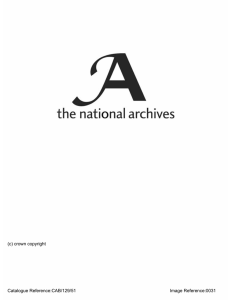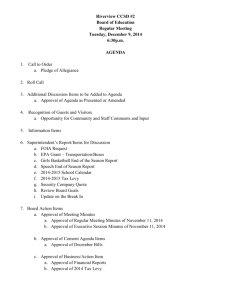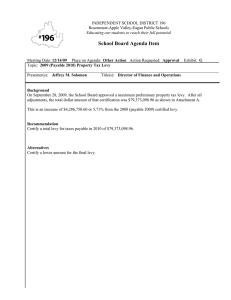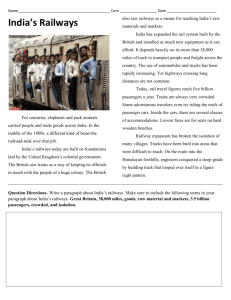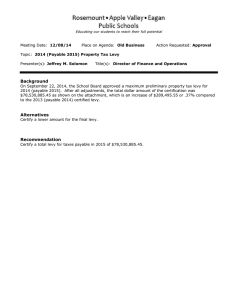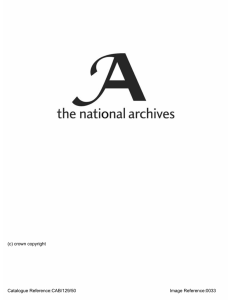(c) crown copyright Catalogue Reference:CAB/129/51 Image Reference:0028
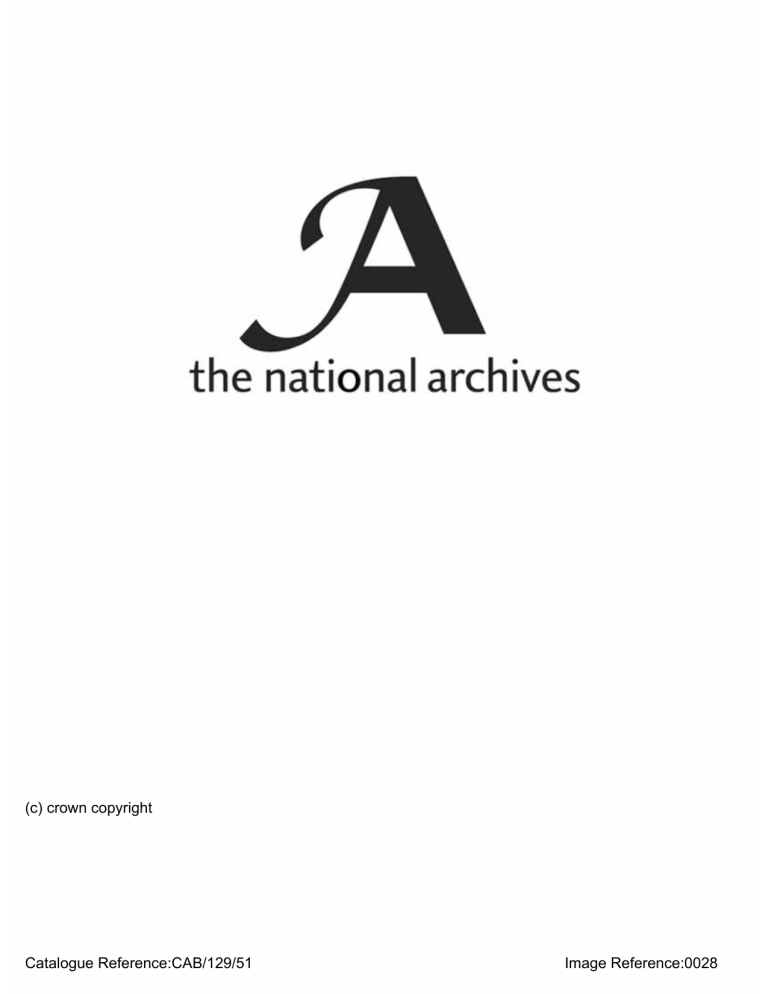
(c) crown copyright
Catalogue Reference:CAB/129/51 Image Reference:0028
C A B I N E T O F F I C E f ^ V ^
I
R E C O R D C O P Y
I S D O C U M E N T I S T H E P R O P E R T Y O F H E R B R I T A N N I C M A J E S T Y ' S
G O V E R N M E N T )
S E C R E T
C . ( 5 2 ) 1 2 8
1 8 t h A P R I L , 1 9 5 2 .
C O P Y N O .
C A B I N E T
R O A D A N D R A I L T R A N S P O R T
N o t e b y t h e L o r d P r e s i d e n t o f t h e C o u n c i l
I c i r c u l a t e f o r c o n s i d e r a t i o n b y t h e C a b i n e t a p r i n t e d v e r s i o n o f t h e d r a f t W h i t e P a p e r w h i c h w a s a n n e x e d t o C . ( 5 2 ) 1 1 0 .
W .
P r i v y C o u n c i l O f f i c e , S . W . I .
1 8 t h A P R I L , 1 9 5 2 .
C O N F I D E N T I A L - P R O O F
TRANSPORT POLICY
Presented by . to Parliament by Command of Her Majesty
1952
Cmd.
L O N D O N
H E R MAJESTY'S S T A T I O N E R Y O F F I C E
N E T
TRANSPORT POLICY
1. The Government have for some time past had under consideration t n t r ' situation resulting from the passing of the Transport Act, 1947. In their view this Act has not achieved and is not likely to achieve its avowed purpose which was " to provide or secure or promote the provision of an efficient, adequate, economical and properly integrated system of public inland transport and port facilities within Great Britain for passengers and goods," and " to provide most efficiently and conveniently for the needs of the public, agriculture, commerce and industry ".
2. In spite of the efforts made by the British Transport Commission and its Executives, integration of its road and rail services into a co-ordinated whole has made little progress, and shows little real prospect of developing into much more than working arrangements between separate transport entities. Even if integration in its fullest sense were practicable, it would result in an immense and unwieldy machine, ill-adapted to meet with promptitude the varying and instant demands of industry.
3. It is the view of the Government that the administration of the railways has become excessively centralised under the Act, and that the
Road Haulage Executive, with the elaborate system of depots working under its direction, cannot give trade and industry the speedy, individual and specialised services afforded by free hauliers before nationalisation, and could not stand up to competition from them.
4. The Transport Act provided for area passenger transport schemes which were intended to cover the whole country, and for schemes for trade harbours or groups of trade harbours. The efforts so far made by the
Commission to promote these schemes have provoked so much opposition that it is clear that they would have little chance of surviving the elaborate procedure provided in the Act for bringing them into force.
5. In the light of the above considerations, the Government have come to the conclusion that amending legislation is imperative. It is not enough merely to amend or remove the undesirable features of the Transport A c t : a positive approach is needed under which, with a minimum of centralised control, the transport system may be stimulated to adjust and develop itself in accordance with public needs, and may regain and increase the flexibility without which the demands of trade, industry and commerce cannot be adequately met.
6. The main features of the Governments proposals are as follows.
Road Haulage
7. Road haulage has in the past been restricted mainly in order to avoid excessive competition between road and rail. In the view of the Government this process has deprived trade and industry of the full advantages of road transport and has driven traders to provide their own road transport to an extent which would not otherwise have occurred. The railways are a national asset and must remain a vital element in transport, and it would be wrong to allow them to fall into decay.
8. The Government have come to the conclusion that the undertaking of the Road Haulage Executive set up under the Transport Act should revert to private enterprise- Tor this purpose it is proposed that the undertaking ' should be divided into operable units (including a suitable proportion of small units) and offered to the public for disposal by open
2 ,bkO
j e n d e r . Units acquired will be given " A " carriers' licences under the fE-oad and Rail Traffic Act, 1933, and will at once be freed from the
Se5-mile limit imposed under the Transport Act. Eventually this limit will be removed altogether and in the interim period the existing permit system will be continued.
9. In order to allow road haulage to play its appropriate economic part in the transport system provision will be made for greater latitude in the granting of new licences under the Road and Rail Traffic Act, 1933, where need for a better or more convenient service is shown. iO. Since the goodwill of the former businesses, of which the Road Haulage
Executive is composed, has substantially disappeared its undertaking is unlikely to be disposed of at the price at which it was acquired. On the other hand, the units will be going concerns and purchasers can rightly be expected to pay for the opportunity to trade which the units will carry with them.
The Railways
11. The present excessive centralisation of the railways will be reduced by giving greater autonomy to areas which may follow the general pattern of the present regions. Scotland will be a separate area. The areas will together continue to constitute a singly entity for financial purposes and. for the control of charges.
12. The existence of these separate areas should encourage a healthy rivalry between them, and give greater scope for initiative than is possible under a single centralised administration.
13. It is not intended that the area organisation should be set out in detail in the Bill. It will be dealt with in a Scheme which the Commission will be required to submit to the Minister of Transport for his approval.
14. The Commission will be given greater latitude in their charges schemes so as to improve the ability of the railways to compete with other forms of transport and will also be empowered within prescribed limits to make immediate increases in charges subject to subsequent approval :by the
Transport Tribunal.
Levy on Road Transport
15. Under these proposals the finances of the Commission will be affected by any loss arising out of the disposal of the Road Haulage Executive^ undertaking and also by any transfer of traffic to road from rail which the expansion of road haulage may entail and which cannot be offset by com pensating economies in railway operation, including the closing down of redundant capacity. It is necessary to make good to the Commission the deficiencies which might otherwise necessarily arise from these two causes.
This it is proposed to do by means of a levy on road goods vehicles, part of the transport system and their owners would be in a privileged position if hauliers were subject to a levy from which they were exempt.
The levy would not, however, extend to small local delivery vans holding
" C " licences.
16. The initial annual amount of the levy, which will be specified in the
Bill, will be £3 million. This figure has necessarily been fixed arbitrarily because the factors which will later determine it will only begin to become operative when the Bill has become law. In view of the large number of
vehicles concerned its incidence will not be heavy. The levy will be adjustei at intervals, of say 3 years, by the Minister of Transport after consultaticpl with the Transport Tribunal. It will be confined to the purposes s t a t e s above and will not be called upon for other purposes such as to make good deficiencies in railway revenues due to a recession in trade or to any failure on the part of the railways to effect reasonable economies.
17. When the amount of any loss arising out of the disposal of the Road
Haulage Executive^ undertaking is known, one element in the levy will be definitely ascertainable^ and the period for amortising this loss can be adjusted to minimise the extent of any change in the levy. The remaining element in the levy can increase only so far as road attracts traffic from rail. The levy can thus never constitute an excessive burden upon road transport.
18. The scheme-making powers of the Commission in regard to road passenger transport and harbours will be repealed.
19.-The Government^ proposals in regard to road passenger transport are limited to repealing the scheme-making powers of the Commission.
They intend, however, to take an early opportunity of reviewing, in the light of present-day conditions, the working of the licensing system for public service vehicles set up under the Road Traffic Act, 1930.
CONCLUSION
20. Such, in broad outline, are the main proposals which the Government intend to embody in a Bill to amend the Transport Act. Other matters of less importance such as bringing the Commission^ goods vehicles within the licensing system set up by the Road and Rail Traffic Act, 1933, will also be included. The general effect of these proposals will be to re-establish a measure of competition between road and rail in the long-distance field.
This will encourage efficiency in both. The railways will be protected by means of the levy from losses of revenue which are due to increased road competition and cannot be met by economies in operation. Trade and industry will get a better service, and the distribution of traffic between road and rail will be determined by the advantage which each has to offer to the trader. This in the opinion of the Government should lead to better and cheaper transport than could possibly result from the " integration " contemplated by the Transport Act, which in any case would have tended to subordinate the needs of the trader to a plan, rather than to adapt transport to his needs.
PRINTED AND PUBLISHED BY HER MAJESTVS STATIONERY OFFICE
To be purchased from
York House, Kingsway, LONDON, w.c.,2 423 Oxford Street, L ONDON , w.l
P.O. Box 569, LONDON, S.E.1
13a Castle Street, E DINBURGH , 2 1 St. Andrew's Crescent, C ARDIFF
39 King Street, M ANCHESTER , 2 Tower Lane, B RISTOL , 1
2 Edmund Street, B IRMINGHAM , 3 80 Chichester Street, B ELFAST or from any Bookseller
1952
Price d.
net
P R I N T E D I N G R E A T B R I T A I N
(15514) Wt.
553-2428 105 4/52 D.L.
